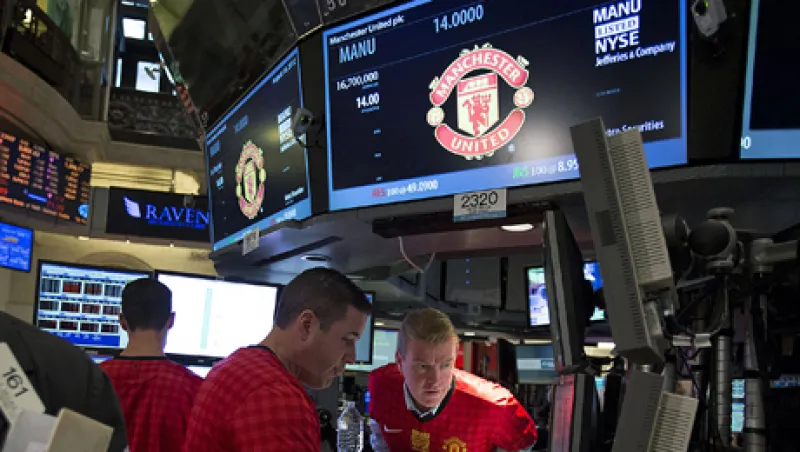After two aborted attempts to raise capital in Singapore and Hong Kong, Manchester United last week raised $234 million in an IPO on the New York Stock Exchange. But the capital — desperately needed by the debt-ridden soccer team and its cash-strapped owners, the Glazer family — may raise more questions than provide answers.
What may create even greater controversy is how a 134-year-old English soccer team was able to use the provisions of the newly implemented U.S. JOBS Act, a bill designed primarily to help small U.S. businesses access much-needed capital to help jumpstart the domestic economy, create jobs, improve governance and build sustainable businesses.
Manchester United reported revenue of $519 million for the year ended June 30, 2011 and profit of $20.3 million on continuing operations. It also said last week that it expects a revenue boost from recent sponsorships such as the one with General Motors ($71 million in 2014, up to a total of $551 million) and accelerated mobile revenues, which grew 88 percent to $24.8 million in fiscal 2011.
But the club is also saddled with enormous debt. It has paid out nearly $800 million in interest and finance costs since July 2008 and has more than $1 billion in debt that it needs to pay off in the next 220 weeks. Before going public, Manchester United’s total liabilities were $950.7 million, and its total indebtedness was at $664.1 million.
Until 2005 Manchester United was a publicly traded team when the Glazer family, which also owns the Tampa Bay Buccaneers and operates shopping malls through its control of First Allied Corporation, took control for about £800 million (then about $1.45 billion). Of that about £265 to £275 million was secured against club assets. The Glazers received a £660 million loan from three U.S. hedge funds: Perry Capital, Och-Ziff Capital and Citadel. They themselves have borrowed £10 million from the club. In 2010, the club announced that the debt was at an all-time high of £717 million. Since that time, the team has taken various steps to refinance the debt — which in 2010 had an overall interest rate in excess of 14 percent.
In its filings it notes that it has paid out nearly $800 million in interest and finance costs since July 2008 and has more than $1 billion in principal and interest it needs to pay off by 2017.
Capital has become a critical element in building a successful soccer team, especially as well-heeled Russian oligarchs, Middle Eastern sheiks and multinational corporations continue to plow hundreds of millions into the teams they own. Without cash to buy players, even highly successful soccer teams such as Manchester United find themselves at a competitive disadvantage. Most recently, Manchester United targeted Brazilian teenage midfielder Carlos Moura but found itself outbid by France’s Paris Saint-Germain, which is backed by the Qatar Investment Authority and signed Moura for $55 million.
So, the team reinvented itself as of April 30, 2012, a little more than three weeks after the JOBS Act was signed into law, and registered as Red Football Shareholder, a Cayman Island start-up describing itself as an emerging growth company to take advantage of JOBS Act provisions. And with the backing of investment bank Jefferies & Co., decided to go public.
Still, it hasn’t been a smooth ride. Investors balked at the initial range of $16 to $20 per share before settling on $14 per share. In a press release Friday, Manchester United said it had sold nearly 1.7 million shares at the $14 price.
Manchester United has marketed itself well. In its roadshows with investors, vice chairman Ed Woodward described the new company as not just a successful football team but a multinational business built around the success of the football team. Indeed, the company initially claimed that it had 659 million followers, later downscaling it to 277 million. It also emphasized that by further engaging sponsors such as GM, Aon and Turkish Airlines, it would greatly enhance revenues and the value of the franchise.
Unfortunately, investors may get little back. The Glazers will continue to control and operate the company. And for their purchase of 16.7 million shares, retail investors will get about 1 percent of the voting rights. As for dividends the company has warned that it does not expect to pay any dividends in the near future.
The success of an English soccer team in using the JOBS Act and the U.S. capital markets to find cheap money is already creating copycats. A slew of “mature” companies — many with large levels of outstanding debt — are using the exemptions provided by the JOBS Act to swap their debt for equity. They include New York supermarket chain Fairway, which has estimated revenue of $700 million, and GPS system seller FleetMatic.
Last month, former U.S. Senator Paul Sarbanes, co-author of the Sarbanes-Oxley Act (SOX), worried that some of the provisions of the new JOBS Act would undermine SOX, especially the one that allows companies to defer corporate governance measures for as many as five years and also delay comprehensive financial disclosures.
“We are a 'foreign private issuer,' as such term is defined in Rule 405 under the Securities Act, and therefore, we are not required to comply with all the periodic disclosure and current reporting requirements of the Exchange Act and related rules and regulations,” says Manchester United in the offering prospectus.
“It’s a scandal waiting to happen,” Sarbanes said.
The JOBS Act was aimed at directing capital into U.S. emerging growth companies. Instead, it may turn into a giant debt swap.






